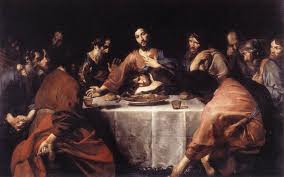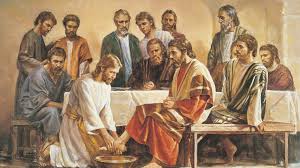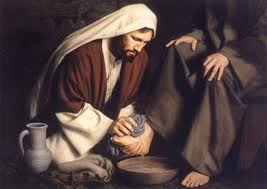
– 28 August 2022 –

Gospel reading: Luke 14:1;7-11
Vs.6 On a sabbath day, Jesus had gone for a meal to the house of one of the leading Pharisees; and they watched him closely.
vs.7 He then told the guests a parable, because he had noticed how they picked the places of honour. He said this,
 vs.8 “When someone invites you to a wedding feast, do not take your seat in the place of honour. A more distinguished person than you may have been invited,
vs.8 “When someone invites you to a wedding feast, do not take your seat in the place of honour. A more distinguished person than you may have been invited,
vs.9 and the person who invited you both may come and say, ‘Give up your place to this man.’ And then, to your embarrassment, you would have to go and take the lowest place.
vs.10 No; when you are a guest, make your way to the lowest place and sit there, so that, when your host comes, he may say, ‘My friend, move up higher.’ In that way, everyone with you at the table will see you honoured.
vs.11 For everyone who exalts himself will be humbled, and the man who humbles himself will be exalted.”
************************************************
We have four commentators available from whom you may wish to choose.
Michel DeVerteuil : Michel, a Trinidadian Holy Ghost Priest, was director of the Centre of Biblical renewal .
Thomas O’Loughlin: Thomas is on the theology faculty of Nottingham University
Sean Goan: Sean studied scripture in Rome, Jerusalem and Chicago and teaches at Blackrock College and works with Le Chéile Schools.
Donal Neary SJ: Donal is editor of The Sacred Heart Messenger Donal*******************************************************
Michel de Verteuil
Lectio Divina The Year of Luke
www.columba.ie

General Textual comments
We must know how to read parables; our problem is that parables are a way of teaching we are not accustomed to in our cultures. We are much more used to edifying stories which tell us of good people whom we are invited to imitate. But a parable is different: its purpose is to capture one particular moment, a deep moment when we experience grace in some way. If – as often happens in the parables of Jesus – there are details in the story, they are there to stimulate our imagination and so to help us re-live that moment in our own experience. Jesus’ parables evoke for us the exciting moment when, for example, we suddenly realize that the long time of waiting for the crops to grow is over, and it is time to reap; the moment of hurt and resentment when we see someone who has worked only one hour getting the same reward as we who worked all day in the sun; the moment when we see clearly how mean we have been in harbouring resentment at some little wrong that a friend has done to us, although we have been greatly blessed in many other ways.
Today’s parable invites us to enter into two precious moments. Don’t hurry; take each one separately and stay some time with it.
The first is in verses 8 and 9: we suddenly discover that we have claimed for ourselves a place that is too high for us; we are not as selfless, generous or compassionate as we thought we were, while we see before us people who really possess these qualities. We had accepted the role in which the community had placed us – as priest or religious or “prominent Catholic” – but in a crisis our frailty is revealed to ourselves alone or to the community; to our embarrassment, we go and take the lowest place. The parable is telling us that when grace comes into our lives it is like that, it is always an opportunity for spiritual growth, painful though it may be.
On the other hand, there is the experience of verse 10, that touching moment that happens every once in a way, when we are made to feel good about ourselves. We were looking after a sick relative, minding a neighbour’s child, working hard at our job, doing it all without fuss but taking for granted that it was the right thing to do; then a person, a Bible passage, or a spiritual book showed us that we were doing something wonderful and, in fact, living the story of Jesus.
The parable conveys exactly the atmosphere of the last judgment in Chapter 25 of St Matthew’s gospel, where the virtuous are quite surprised that their little acts of kindness were really done to Jesus, and the wicked suddenly realize that they had neglected to serve him. Today’s passage shows us that it is not merely a teaching about the last judgment, but about what always happens when God touches us.
Be careful about applying verses 8 and 9 to others, as you could easily fall into a self-righteous or judgmental reading. But feel very free in letting verse 10 remind you of people you admire, the kind of people who, when you praise them are surprised or even embarrassed – “I was only doing what anyone in my position would do.” The parable is telling you to think of someone like that, and you will have an idea of what it is to be a Christian. Enter into the concreteness of the parable, remembering people that you don’t have to worry about when you invite them to your home or to a function; you know that they will be happy with whatever they find. Enter into their spirituality, the deep attitude which makes them like that, and thank God for them.
 You might like to identify with the host in the parable, the people in your life who have shown you your weaknesses and made you take the lowest place where you belonged. At the time, you were angry with them, but today, as you meditate on the passage, you thank God that he sent them to help you grow spiritually. Thank him too for the one who invited you to see your greatness and to experience yourself honoured by all those who sit at table with you, your family or church community. Admire the insightfulness of the host, and his courage; this will suggest to you the role of the Christian in a community, or that of the Church in society – to expose all forms of phoniness on the one hand, and on the other to invite little people to take their rightful place of honour, even if it means that those in high places will be embarrassed.
You might like to identify with the host in the parable, the people in your life who have shown you your weaknesses and made you take the lowest place where you belonged. At the time, you were angry with them, but today, as you meditate on the passage, you thank God that he sent them to help you grow spiritually. Thank him too for the one who invited you to see your greatness and to experience yourself honoured by all those who sit at table with you, your family or church community. Admire the insightfulness of the host, and his courage; this will suggest to you the role of the Christian in a community, or that of the Church in society – to expose all forms of phoniness on the one hand, and on the other to invite little people to take their rightful place of honour, even if it means that those in high places will be embarrassed.
The passage ends with verse 11, another of Jesus’ great sayings; we know that the first Christians loved it very much because it is found several times in the gospels, and in different contexts. There is no need to join it to the parable (although you may find that it sums up its message for you); you can concentrate on entering into its truth in a new and deeper way than ever before, and this could be the special grace that God has in store for you this Sunday.  The saying is sometimes taken to mean that there is something wrong in holding high office, or even in wanting to, or that it is necessarily virtuous to chose a lowly position in a community. In fact, choosing a lowly position could be an evasion of a responsibility which God wants us to assume. There are many passages in the Bible which correct such false interpretations. In any case, the saying is not dealing with that question at all.
The saying is sometimes taken to mean that there is something wrong in holding high office, or even in wanting to, or that it is necessarily virtuous to chose a lowly position in a community. In fact, choosing a lowly position could be an evasion of a responsibility which God wants us to assume. There are many passages in the Bible which correct such false interpretations. In any case, the saying is not dealing with that question at all.
We can interpret those who humble themselves as the little people in a community, those who go about their business even though they are not given due recognition. Those who exalt themselves would be those who consider themselves superior to others, and oppress them with their superior attitudes. The saying then becomes a prayer of thanksgiving like the Magnificat, or a prayer of trust, leaving to God the work of establishing his kingdom of peace and justice. It also becomes a challenge to us to play our part in correcting the imbalances of society.
You can also read the saying as a paradoxical law of spiritual growth. There is a strong tendency in our culture to be self-centered in our desire to grow spiritually. Jesus is telling us that if we try too much to measure our spiritual growth, we end up regressing. If we leave ourselves in God’s hands, letting him do the exalting, as it were, we give ourselves space to grow. St Francis expressed this attitude perfectly when he said: “What I am before God is what I am, and nothing more.” Don’t remain abstract at this point: remember the moment when you understood this law, and moved away from preoccupation with yourself, and thank God for sending you Jesus to teach you through a friend or a spiritual guide. Pray for someone who is making that same mistake, that they may experience the “exaltation” that flows from total trust in God’s love, which is what the saying means by humbling ourselves.

We are, all of us, in God’s loving hands
Look back, then, to verse 1 in the passage, and see Jesus in that hostile environment, perfectly free, not afraid to accept an invitation to have a meal with people who he knew did not share his values. The secret to his freedom is, of course, precisely the attitude he taught in this parable: he knew that he was in his Father’s hands, and that was sufficient for him. Compare him with those others who were picking the places of honour, and recognize two attitudes which we have all adopted at times, and which we have seen in our communities.
******************************************
Thomas O’Loughlin,
Liturgical Resources for the Year of Luke
www.Columba.ie
Introduction to the Celebration
Today at our meal in this house we recall a Sabbath day meal when Jesus saw how people sought out places of honour at the table, and he reminded them that the values of the kingdom are  the opposite of the earthly values of power and prestige: in the kingdom the humble shall be exalted. Now let us reflect on how we have gathered for this meal with Jesus: do we see each other as sisters and brothers; do we see ourselves as servants to each other; and do we see ourselves as the servants of all who are poor.
the opposite of the earthly values of power and prestige: in the kingdom the humble shall be exalted. Now let us reflect on how we have gathered for this meal with Jesus: do we see each other as sisters and brothers; do we see ourselves as servants to each other; and do we see ourselves as the servants of all who are poor.
Gospel Notes
This story is found only in Luke. The omission of vv 2-6 is a piece of careful editing as it removed a healing story which, if left with today’s gospel, would have confused its message. Given that this text is being interpreted in the context of a Sunday Eucharist, it is an ideal text for exegesis in a homily.
Homily Notes
1. One of the problems that beset the early generations of Christians was disputes at the Eucharistic meal over the rich looking after themselves and disputes over precedence in a highly stratified society. Indeed, these difficulties may have been responsible for the way the ritual community meal developed into the ritual formal meal that we know as ‘The Eucharist’ (a name that emerged in the second century for a specific religious ritual). Luke was fully aware of these difficulties as in Acts he presents an idealised ‘original period’ that he wants communities to take as their model for how they should behave at this meal. So when Luke presents Jesus at a Sabbath meal teaching on how people should behave at a meal if they are wise, he wants his audience to see this teaching as applying directly to them and their behaviour at the Sunday meal.
2. So hearing this gospel today at our Sunday Eucharist is a direct invitation to us to see if our community practice at our sacred meal measures up to Jesus’s teaching.
3. The characteristics are:
Everyone must act with humility. A practical consequence of this is that everyone must see themselves as the servants of the community rather than those whom the community might feel honoured to serve.
 There must be no pandering or favouritism for the rich and powerful. Around the Lord’s table there is a state of equality for all are equally there by God’s invitation, grace, and mercy. Practically this has implications when ‘dignitaries’ are present and given special treatment, but it also has implications for ordinary gatherings where there can be special groups that see themselves as being ‘special’ in some way within the community and who seek to have this recognised.
There must be no pandering or favouritism for the rich and powerful. Around the Lord’s table there is a state of equality for all are equally there by God’s invitation, grace, and mercy. Practically this has implications when ‘dignitaries’ are present and given special treatment, but it also has implications for ordinary gatherings where there can be special groups that see themselves as being ‘special’ in some way within the community and who seek to have this recognised.
There must be a welcome in the community for the needy all those signified by the phrase ‘the poor, crippled, lame, and blind’. This means that the community must be making special efforts to see that no individual or group are excluded from the Lord’s meal or made feel that they are not ‘our sort’.
A tone of genuine welcome and a spirit of service to one another should be palpable qualities of the assembly.
The community must be aware of the dangers of a small clique running the parish so that the community’s assembly is only an excuse for their needs for self-importance to be fulfilled.

4. Asking these questions can be hard, but the more the questions are feared, the more they are needed – and the more there is a need for the community to hear this gospel.
*****************************
Sean Goan
Let the Reader Understand
www.Columba.ie
Gospel Notes
Once again in Luke’s gospel a meal forms the backdrop to some important teaching of Jesus about the values of the kingdom of God. In ordinary society the normal practice is to be self promoting, always seeking to be one step ahead or to find ways to have one’s reputation enhanced. Jesus sees this as evidence of shallow behaviour, guided by a mistaken notion of a person’s true worth. The value of humility as taught by Jesus is that our understanding of our worth is not dependant on being better than or more important than somebody else. It is not about comparison at all. Our true sense of self worth comes from within. Hence the significance of Jesus’ command to the man who had invited him to the meal. The next time he has a dinner, instead of using it as an occasion to further himself, why doesn’t he invite all those people who can’t repay him? No doubt that suggestion ensured that Jesus was not invited back, but it gently exposes the often shallow ways in which people deal with each other.
Reflection
 Humility is a virtue not much spoken about today. This is the era in which self esteem is promoted, sometimes to the detriment of all other aspects of a person’s development. Of course there is no conflict between true self esteem and the value of humility as taught by Jesus. The problem may be that nowadays humility might be seen as weakness, the humble person might be regarded as a pushover. That would be a mistake and we only have to look to Jesus to see how big a mistake. The philosophy that might is right is capable of unleashing dreadful violence and of inflicting untold damage on human society. It represents the opposite worldview to that preached by Jesus and brings about no real change. However, to live as gently and humbly as Jesus did is to commit oneself to a better world, armed only with a deep conviction that God is love.
Humility is a virtue not much spoken about today. This is the era in which self esteem is promoted, sometimes to the detriment of all other aspects of a person’s development. Of course there is no conflict between true self esteem and the value of humility as taught by Jesus. The problem may be that nowadays humility might be seen as weakness, the humble person might be regarded as a pushover. That would be a mistake and we only have to look to Jesus to see how big a mistake. The philosophy that might is right is capable of unleashing dreadful violence and of inflicting untold damage on human society. It represents the opposite worldview to that preached by Jesus and brings about no real change. However, to live as gently and humbly as Jesus did is to commit oneself to a better world, armed only with a deep conviction that God is love.
****************************************************
4. Donal Neary S.J.
Gospel reflections for Year C: Luke
www.messenger.ie/bookshop/
Strange ways
A fellow said – ‘bad enough he was in the pub, but now I have to be beside him at Mass’. Said jocosely, but the point is that everyone is invited to the banquet of Jesus like the gospel today. We never know who we might meet at Mass.

Jesus has strange ways of looking on whom to invite and who are the most important.
There were strict codes of place-names and seating at this type of party. Jesus was going to cut through these. He also had upset things earlier by healing a very sick man on the Sabbath. He started talking then about who to invite.
There was no pecking order at his invitation. The narrow door of last week has been pushed wide to let them all in.
The community of Christ doesn’t admit of differences that put us down. He was always saying this, and saying it to the proud and haughty. For others, life had taught them to be humble and they could probably enjoy this feast.
Humble people are grateful for small and big things; they pray often and know their need for prayer; they know they have faults and are no better or worse than most, and know they need God’s mercy; they love children because they are childlike at times, and they know they are not humble all the time.  They don’t take themselves too seriously and are compassionate to the faults of others. They know who they are – in one way the least of all, but always loved, always forgiven, always a child of God.
They don’t take themselves too seriously and are compassionate to the faults of others. They know who they are – in one way the least of all, but always loved, always forgiven, always a child of God.
Lord,
teach me to know myself well,
so that I can better know your love.